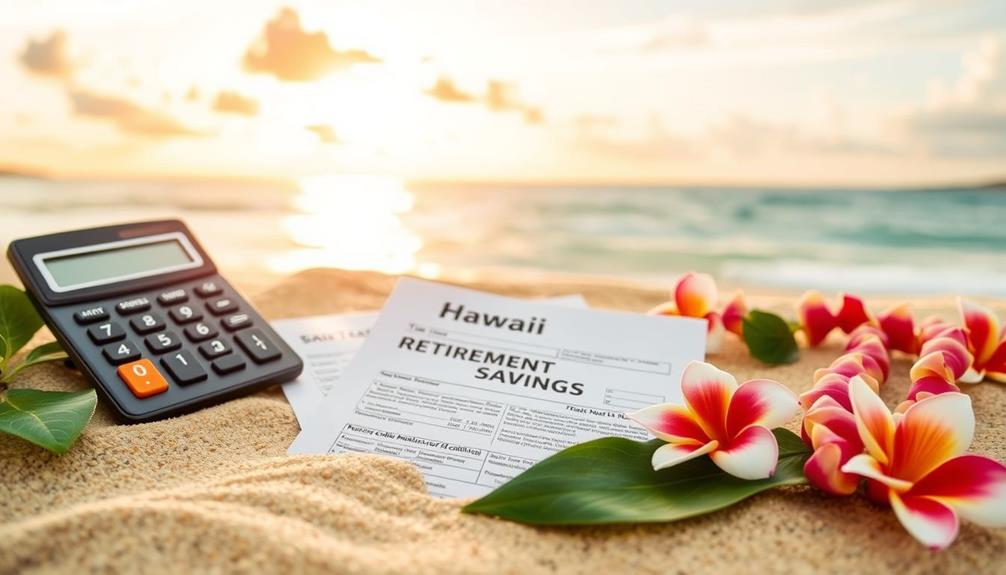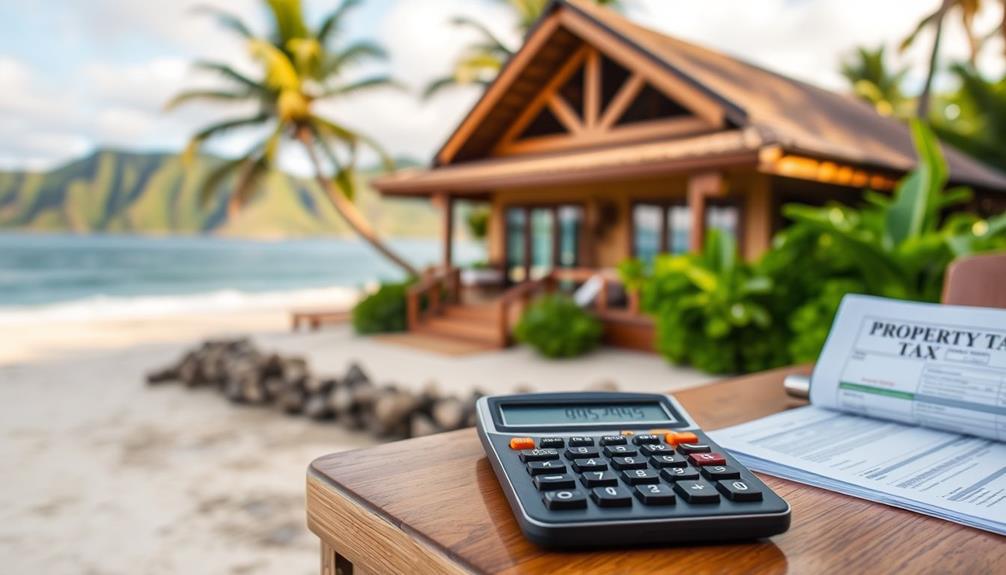When you withdraw funds from your IRA in Hawaii, anticipate being subject to state taxes on the entire amount. Hawaii taxes all traditional IRA withdrawals as income, with rates ranging from 1.4% to 11% based on your income level. Unlike other retirement benefits, like Social Security, IRAs do not come with any state-specific tax exemptions. It is important to strategically manage your withdrawals in order to minimize your tax burden. Seeking assistance from a tax professional can aid you in effectively navigating these consequences. By grasping these details, you can better organize your retirement funds and enhance your financial strategy for the future.
Key Takeaways
- All traditional IRA withdrawals in Hawaii are fully taxable as income, impacting overall tax liability.
- Hawaii's income tax rates range from 1.4% to 11%, depending on income brackets.
- Public pensions are exempt from state income taxes, while private pensions and IRA withdrawals are taxable.
- Seniors can benefit from tax exemptions on Social Security income and certain retirement distributions up to $6,000.
- Strategic planning for IRA withdrawals is essential to minimize state tax implications and maintain financial health.
Overview of Hawaii's Tax Environment

Hawaii's tax environment can greatly impact your retirement finances, especially when it comes to IRA withdrawals. The state has a progressive income tax system with rates ranging from 1.4% to 11%, meaning your retirement income taxable can notably influence how much you keep after taxes.
All withdrawals from retirement accounts, including IRAs, are fully taxable, and you won't find any deductions for these funds. This can lead to a higher tax burden than you might expect.
On a positive note, Social Security income is exempt from Hawaii state income taxes, which can provide some relief if you rely on these benefits.
When it comes to property taxes, Hawaii boasts a relatively low average effective rate of 0.26%. However, be mindful of the high property values, as they can lead to substantial payments annually.
Additionally, if your estate exceeds $5.49 million, you'll need to take into account the state's estate tax, which can complicate your wealth transfer strategies.
Understanding these elements of Hawaii's tax environment is essential for effective retirement planning and maximizing your financial well-being in your golden years.
Income Tax Rates for Retirees

When planning for retirement in Hawaii, it's vital to understand the state's income tax rates, which range from 1.4% to 11%. This progressive system means that your income level will greatly impact your overall tax liability.
For Hawaii residents, withdrawals from retirement accounts, such as 401(k)s and IRAs, are fully taxable under these state income taxes. As a result, you'll want to strategize your withdrawals to minimize your tax burden.
Fortunately, Social Security benefits provide some relief, as they're exempt from state income taxes. This exemption can be particularly beneficial for retirees who rely heavily on these benefits.
Additionally, public pensions are also exempt, which can further ease your financial planning. However, keep in mind that private pensions are taxable, so you'll need to factor this into your overall income calculations.
Understanding these income tax rates is essential for effectively managing your retirement funds and planning your withdrawals. By staying informed, you can navigate Hawaii's tax environment and make the most of your retirement savings while minimizing your tax liabilities.
Taxation of IRA Withdrawals

If you're planning to withdraw from your traditional IRA in Hawaii, be prepared for the full impact of state income taxes on your distributions. Unlike Social Security benefits, all amounts you withdraw from your IRA are considered taxable retirement income, contributing directly to your overall income.
Hawaii's state income tax rates range from 1.4% to 11%, depending on your income bracket. This progressive income tax structure means that larger withdrawals can push you into higher tax brackets, increasing your tax liability considerably.
Unfortunately, Hawaii doesn't offer any state-specific deductions for taxable retirement income, so you must account for the entire amount of your IRA distributions when calculating your taxes.
Planning for the taxation of IRA withdrawals is essential to avoid unexpected financial strain. If you don't factor in these state taxes, you might find yourself facing a larger tax bill than anticipated, which could impact your retirement budget.
As a result, it's wise to consult with a tax professional to understand how your IRA withdrawals will affect your overall financial situation in Hawaii. Proper planning guarantees you can enjoy your retirement without unwelcome surprises.
Property Tax Considerations

Managing your finances in retirement means considering various tax implications, including property taxes. In Hawaii, retirees benefit from the lowest effective property tax rate in the United States at just 0.26%. This can provide some relief as you navigate the financial landscape of retirement in Hawaii.
However, be aware that the high median home prices, around $602,100, can lead to annual property tax payments averaging about $1,893.
It's essential to remember that property tax rates can vary by county, so you should research local rates when budgeting. Additionally, if you qualify, homestead exemptions can greatly reduce your property tax liabilities, providing further financial relief.
While property taxes may be low, the overall cost of living in Hawaii is remarkably higher than the national average, which can impact your financial planning.
As you prepare for retirement, factor in these property tax considerations to guarantee your budget aligns with your expected expenses. By understanding the implications of property tax and taking advantage of available exemptions, you can better manage your financial resources during your retirement years in paradise.
Sales Tax Implications

In Hawaii, understanding sales tax implications is vital for retirees as it directly affects your everyday expenses. The General Excise Tax (GET), functioning as a sales tax, is set at 4% statewide, with some counties adding an additional 0.5%. This can greatly impact your overall costs, especially since Hawaii taxes groceries—a necessary expense for most retirees.
Here's a breakdown of the sales tax implications for your retirement income:
| Item | Tax Rate |
|---|---|
| General Excise Tax | 4% (additional 0.5% in some counties) |
| Groceries | Taxed |
| Prescription Drugs | Exempt for seniors |
| Average Combined Sales Tax | ~4.5% |
Awareness of these sales tax implications is essential for retirees in Hawaii, as it can affect your purchasing power. With food being a considerable part of your budget, knowing how much you'll pay in sales tax can help you plan your finances more effectively. Ultimately, understanding these factors allows you to manage your retirement income wisely and make the most of your resources.
Special Exemptions and Deductions

When planning your IRA withdrawals, you should be aware of special exemptions and deductions that could ease your tax burden.
For instance, certain retirement income, like Social Security benefits and military pensions, is exempt from state taxes in Hawaii.
Understanding these rules can help you strategize your withdrawals to maximize your retirement income while minimizing tax liabilities.
Retirement Income Exemptions
Retirees in Hawaii often find themselves maneuvering a complex landscape of state tax implications, particularly when it comes to retirement income exemptions. A significant financial advantage for retirees is that Social Security benefits are exempt from state income taxes. Additionally, public pensions also enjoy full exemption, greatly reducing the overall tax burden for eligible individuals.
However, you should be aware that private pensions aren't as fortunate; they're subject to Hawaii's state income tax rates, which can range from 1.4% to 11% based on your income bracket.
Furthermore, if you plan to make withdrawals from retirement accounts like 401(k)s or IRAs, these distributions will be fully taxable at the state's income tax rates, as no specific exemptions or deductions apply.
On a positive note, if you're 65 or older, you may qualify for property tax exemptions, easing some of the financial pressure in a state known for its high cost of living.
Understanding these nuances can help you better navigate your retirement finances while maximizing your benefits and minimizing your tax liabilities.
Tax Deductions for Seniors
Maneuvering tax deductions in Hawaii can greatly influence your retirement finances, especially for seniors. One of the main advantages you'll enjoy is that Social Security retirement benefits are exempt from state income taxes. This exemption can provide significant relief, particularly if you're relying on these funds to cover living expenses.
If you're 65 or older, you may also qualify for specific property tax exemptions, which can help lower your tax burden on real estate. While there aren't specific tax deductions for traditional retirement income, the first $6,000 of retirement distributions you withdraw is exempt from taxes, giving you a bit more breathing room.
However, keep in mind that Hawaii has a progressive income tax rate, meaning your overall tax rate can range from 1.4% to 11% based on total income. For seniors, military retirement pay and government pensions are exempt from state taxes, while private pensions and IRA withdrawals are fully taxable.
This highlights the importance of developing a strategic financial plan to maximize your tax deductions for seniors and minimize your state tax liabilities.
IRA Withdrawal Strategies
Strategic planning becomes essential when managing IRA withdrawals in Hawaii, especially given the absence of special exemptions or deductions for retirement income.
You'll need to understand how state income tax rates, ranging from 1.4% to 11%, can impact your tax liability. Since all withdrawals from traditional IRAs and 401(k)s are fully taxable, higher withdrawals might push you into a higher tax bracket due to Hawaii's progressive tax system.
To minimize this tax burden, consider making strategic withdrawals. You might want to limit your annual distributions to stay within a lower tax bracket.
Additionally, supplementing your retirement income with Social Security benefits can be advantageous since they're exempt from state income taxes. This approach can help you manage your overall income without incurring hefty tax liabilities.
If you're interested in alternative investments, utilizing a self-directed IRA might offer some tax advantages, although keep in mind that distributions from these accounts will still be taxed at Hawaii's state income tax rates.
Estate Tax Overview

When planning your estate in Hawaii, it's essential to understand the estate tax thresholds and rates.
If your estate exceeds $5.49 million, you could face a significant tax burden, with rates ranging from 0.8% to 16%.
Knowing these details can help you make informed decisions to protect your wealth for future generations.
Estate Tax Thresholds Explained
Estate taxes often catch many people off guard, especially in states like Hawaii, where the threshold for taxation is set at $5.49 million. This means if your estate is valued above this amount, you'll need to evaluate the estate tax implications during your retirement planning.
Hawaii's estate tax rates range from 0.8% to 16%, depending on the estate's value, which can greatly affect your heirs' inheritance.
Unlike some states, Hawaii doesn't impose an inheritance tax, which can provide additional financial relief for your heirs. This could be an essential factor in your estate planning strategy, ensuring that more of your wealth is passed on without additional taxation.
It's also important to note that the estate tax threshold in Hawaii is indexed for inflation, meaning it may be adjusted over time.
For retirees, understanding these thresholds is significant. It allows you to make informed decisions about your assets and how they'll be distributed.
Rates and Exemptions Summary
Charting Hawaii's estate tax landscape can feel challenging, but understanding the rates and exemptions is key to effective planning. Here's what you need to know:
- Estates valued over $5.49 million face an estate tax.
- Rates range from 0.8% to 16%, depending on the estate's value.
- Hawaii's estate tax exemption is considerably lower than the federal exemption of $12.92 million.
For you, this means that if your property exceeds the $5.49 million threshold, your heirs could face substantial estate tax liabilities.
Since Hawaii doesn't impose taxes on estates below this exemption, proper planning becomes essential, especially if you have high-value properties or considerable retirement income.
As you consider your estate planning, remember that the estate tax can considerably impact wealth transfer.
By understanding these rates and exemptions, you can better strategize to minimize potential tax liabilities.
Don't overlook how the estate tax intersects with your overall financial planning in Hawaii.
The choices you make now can help secure a brighter financial future for your beneficiaries, allowing them to focus on their inheritance rather than tax burdens.
Planning Strategies for Retirees

Planning your retirement withdrawals can notably impact your overall financial health, especially in states like Hawaii with high progressive income tax rates. To minimize your tax burden, be strategic about your withdrawals from IRAs and 401(k)s, as these are fully taxable at state income tax rates.
Consider timing your withdrawals to keep yourself in a lower tax bracket, which can greatly reduce the amount you owe in state taxes.
Since Hawaii doesn't offer deductions for taxable retirement income, tax-efficient withdrawal strategies become essential. You might want to prioritize withdrawals from your taxable accounts or delay distributions from tax-deferred accounts until necessary. This way, you can better manage your state tax liabilities.
Don't forget that Social Security benefits are exempt from state income taxes, offering an additional avenue for tax savings.
Consulting with financial advisors who understand Hawaii's unique tax environment can provide valuable insights tailored to your situation. They can help you develop a thorough plan that considers both state and federal tax implications, ensuring your retirement income is structured for maximum benefit.
Resources for Tax Assistance

Maneuvering the complexities of state tax implications for IRA withdrawals can feel overwhelming, but a wealth of resources is available to assist you. Here are some key options to take into account:
- Hawaii's Department of Taxation: Access forms and publications that clarify state tax implications related to your retirement account withdrawals.
- Local Tax Professionals: Get personalized advice tailored to your situation, especially regarding Hawaii's state income tax rates, which can range from 1.4% to 11%.
- AARP Foundation Tax-Aide Program: Benefit from free tax assistance specifically for seniors, helping you understand the tax implications of your IRA distributions.
In addition to these options, don't overlook online resources. The IRS website and Hawaii's state tax website can provide valuable information about federal and state regulations affecting retirement account withdrawals.
Also, think about attending workshops and seminars hosted by financial advisors in Hawaii. These events can equip you with effective strategies for managing your IRA withdrawals and minimizing tax liabilities.
Frequently Asked Questions
Do You Pay State Taxes on IRA Withdrawals?
Yes, you pay state taxes on IRA withdrawals. These withdrawals are treated as ordinary income, and the tax rate depends on your total income level, affecting your overall tax liability considerably. Plan accordingly to minimize taxes.
Is an Inherited IRA Taxable in Hawaii?
Yes, inherited IRAs are taxable in Hawaii. You'll face state income tax on distributions, which can range from 1.4% to 11%, depending on your total income. Consulting a tax advisor is essential for guidance.
What Is the State Income Tax in Hawaii?
In Hawaii, state income tax rates range from 1.4% to 11%, depending on your income level. If you earn over $200,000 as a single filer, you'll face the highest rate of 11%.
How Do States Tax Retirement Income?
When it comes to retirement income, states dance to their own tune. Some exempt Social Security, while others tax everything. You'll need to navigate these rules to maximize your retirement income effectively.
Conclusion
In the grand scheme of retirement, maneuvering Hawaii's tax landscape can feel like trying to find a Wi-Fi signal in a remote area. But understanding the state tax implications for your IRA withdrawals is essential. By staying informed about income tax rates, exemptions, and planning strategies, you can make the most of your hard-earned savings. So, embrace the aloha spirit and take control of your financial future—because every dollar counts when you're enjoying your paradise.









